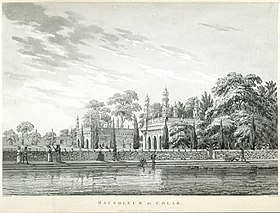Fateh Muhammad or Nadim Sahib (b. 6 May 1684 – 9 September 1729 d.) was a General of the Mughal Empire in Mysore region, and he was the father of Mysore Sultanate founder Hyder Ali, who was his fifth child from his third wife, and the Paternal-Grandfather of the Mysore Sultanate Ruler Tipu Sultan.[1][2]
Fateh Muhammad Nadim Sahib | |
|---|---|
 Sketch of Fateh Muhammad's mausoleum in Kolar. | |
| Years active | 1697 – 1729 |
| Born | 6 May 1684 Doddaballapur (Bengaluru Rural, Bijapur Sultanate |
| Died | 9 September 1729 (aged of 45 years 4 months 3 days) Carnatic Sultanate |
| Cause of death | Killed in action |
| Family | Quraish |
| Issue | Hyder Ali Shahbaz |
| Father | Muhammad Ali |
| Mother | Sakina Bi |
| Military career | |
| Allegiance | Mughal Empire |
| Service | Nawab of Carnatic |
| Rank | Sepoy |
| Battles / wars | Mughal-Maratha Wars |
He was born on 6 May 1684 CE at Doddallapur in the Era of Moghul empire and the reign of Padishah Aurangzeb, He died at the age of 45 years 4 months 3 days when he was fighting in a battle between the Subedar of Sira and Jaher Khan of Chittor Subah, Fath Muhammad was killed on 9 September 1729 A.D. He was buried at Kolar alongside his parents. .
At an early age, he served as a commander of 50 men in the Rocket artillery of the army of the Nawab of Carnatic. It is believed that he served alongside Zulfiqar Ali Khan, the first Nawab of the Carnatic during the Siege of Jinji. This was maintained under the command of the Mughal Emperor Aurangzeb with the purpose of capturing or killing the renegade Maratha ruler Rajaram.[3] then later in 1700s he became a valuable Military Commander. Fath Muhammad eventually entered the service of the Wodeyar Rajas of the Kingdom of Mysore, where he rose to become a powerful military commander. The Wodeyars awarded him Budikote as a jagir (land grant), where he then served as Naik (Lord).[4]
See also
editReferences
edit- Bowring, Lewin (1899). Haidar Alí and Tipú Sultán, and the Struggle with the Musalmán Powers of the South. Oxford: Clarendon Press. OCLC 11827326.